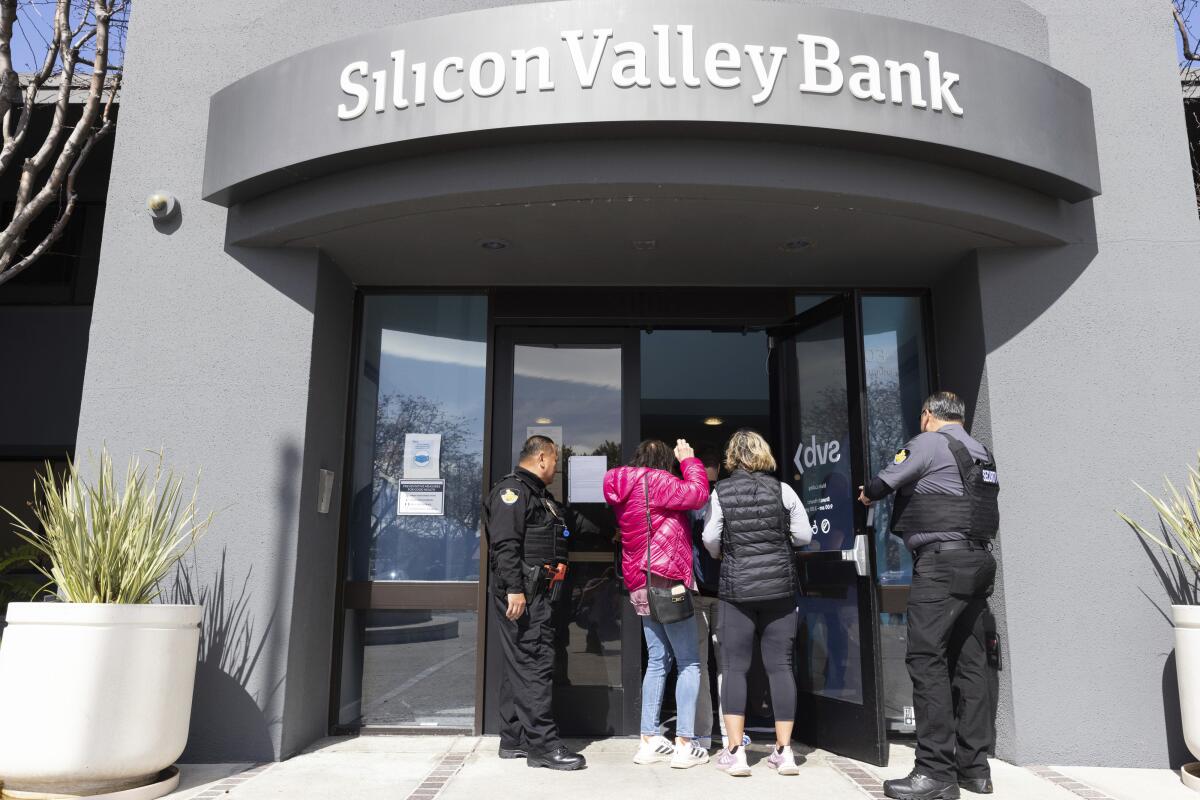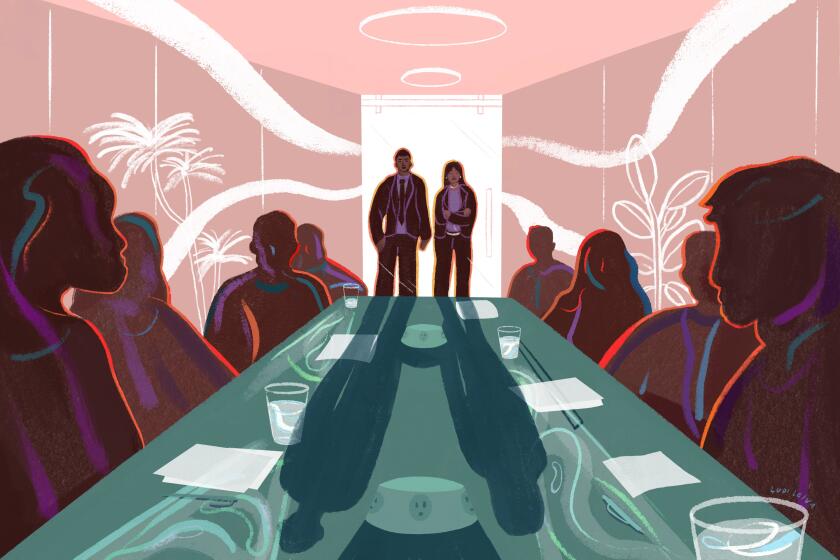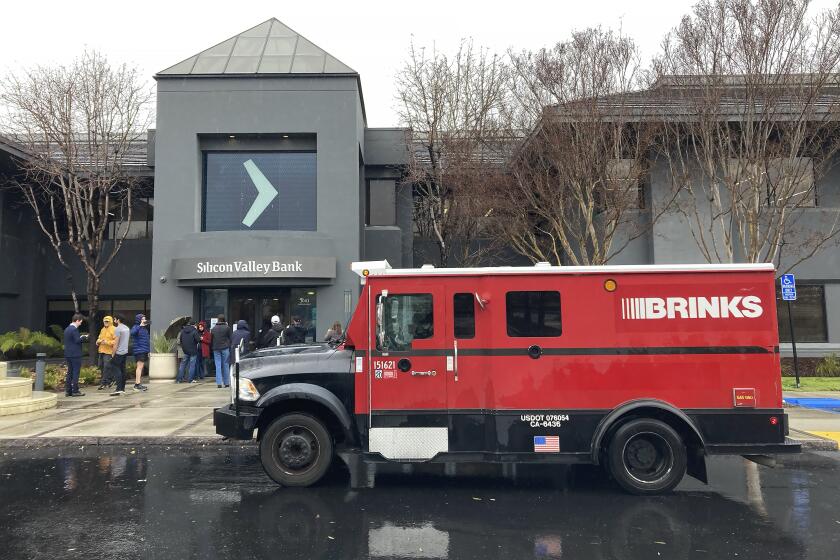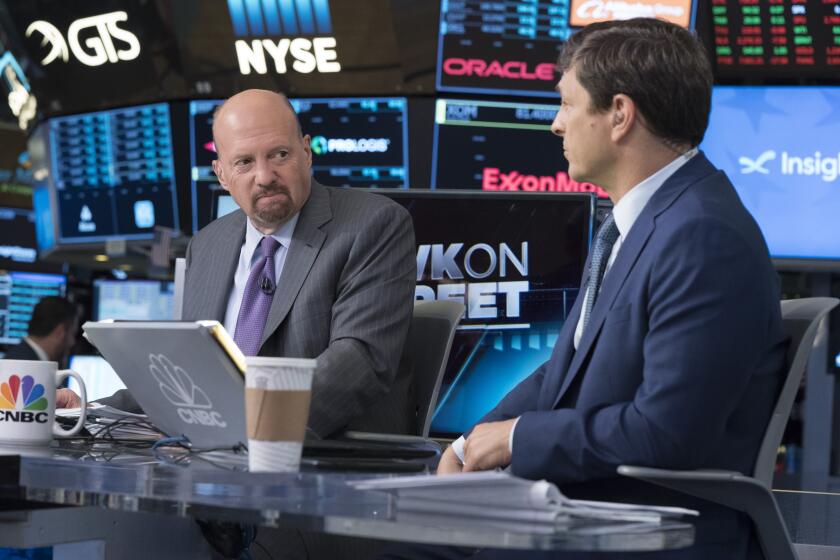Claims link ‘woke’ policies to Silicon Valley Bank’s demise. Experts say no

- Share via
As Wall Street reels from the swift demise of Silicon Valley Bank — the biggest American bank failure since the 2008 financial meltdown — some social media users are homing in on a single culprit: its socially aware, or “woke,” agenda.
But the Santa Clara, -Calif.-based institution’s professed commitment to diversity, equity and inclusion, or DEI, wasn’t a driver of the bank’s collapse, banking and financial experts said.
Rather, they said the nation’s 16th largest bank failed because of poor investment and risk strategies that left the bank with insufficient cash to weather a mass withdrawal of assets from its largely tech sector customers, who have been particularly hard hit in the current economy.
There’s also no evidence to support claims that the bank’s stated commitment to supporting and investing in diversity and sustainability efforts played a role in its demise, according to experts.
Social media posts in the wake of the collapse have nonetheless pointed critically to any number of diversity efforts at the bank, such as the launch of a month-long LGBTQ pride campaign or donations to Black Lives Matter and other racial justice causes.
Latinos are the nation’s largest ethnic or racial minority with 18.9% of the population, yet few ascend to the pinnacle of U.S. corporate power: board member.
Some even cited the bank’s 2022 Environmental, Social and Governance report, which includes a commitment to provide at least $5 billion in loans, investments and other financing for sustainability efforts by 2027.
“The WOKE agenda coming from SVB is in a large part to blame for their FAILURE,” declared a Twitter user in a post that had been liked or shared nearly 4,000 times as of Wednesday. “The insane left-wing agenda is BANKRUPTING our future. Go woke, GET BROKE!”
But the institution’s fall had all the hallmarks of a “classic run on the bank,” Peter Cohan, a professor of management practice at Babson College in Wellesley, Massachusetts, said in an email. “A focus on DEI had nothing to do with the collapse of SVB.”
Rodney Ramcharan, a finance professor at the University of Southern California’s Marshall School of Business, agreed, dismissing criticism that the bank reportedly donated millions to BLM and similar groups over the years as “trivial and irrelevant,” given the bank had more than $200 billion in assets before it failed.
It’s not even clear the bank donated more than $70 million to those causes, as social media users and conservative news outlets claim. Many cite a database maintained by the Claremont Institute, a California-based conservative think tank, that purports to track donations to the “BLM movement and related causes.”
Financial turmoil has some people wondering if a systemic problem is putting all banks in peril, as in the Great Recession. Experts say that isn’t the case.
The institute database links to several SVB company reports and press releases to support its tally, but an Associated Press review shows none of the documents actually mention Black Lives Matter or BLM. In fact, the majority of the documents deal with the bank’s environmental and sustainability efforts.
Spokespersons for the institute and BLM didn’t respond to emails seeking comment Thursday.
In addition, nothing in the bank’s publicly available financial disclosure reports suggests any damaging spending on diversity initiatives, Ramcharan said. If there had been issues they would be included in reports to regulatory agencies such as the Federal Reserve.
“The bank would have suffered loan losses — writing down bad loans made to ‘woke’ firms,” he explained in an email. “So this is not a matter of opinion, but actual data. Instead, there are no unusual loan losses or loan loss provisioning.”
The bank’s $5 billion commitment to sustainability efforts represents a promise to make future loans and isn’t indicative of financial investments that led to the bank’s failure today, said William Chittenden, a professor at Texas State University’s McCoy College of Business Administration.
Silicon Valley Bank telegraphed that its securities holdings were underwater. Why didn’t the regulators act sooner?
“If we were in 2027 and SVB had billions in defaulted ‘sustainability loans,’ then I would agree that the failure could be attributed to the types of loans they made,” he wrote in an email. “But to say the bank failed for loans they likely haven’t even made yet makes no sense to me.”
What is clear from financial disclosure documents is the bank, which was founded in 1983, had not properly managed the risk on large investments it had made in recent years as it rapidly grew, experts agreed.
From 2019 to 2021, SVB purchased tens of billions of dollars in mortgage-backed securities, U.S. Treasury bonds and other relatively conservative investments at low interest rates, said Aaron Klein, a financial expert at the Brookings Institution, a Washington, D.C.-based think tank. But the bank didn’t hedge those bets with other investments.
As interest rates rose rapidly this past year, the value of those investments declined just as the bank’s customers were increasingly drawing down on their funds to make ends meet in a worsening economy, he and other experts said. The bank was forced to sell $21 billion securities at a nearly $2 billion loss.
“Bottom line: The bank failed because of liquidity issues,” Chittenden wrote in an email. “The failure had nothing to do with the quality of any ‘woke’ bank’s loans.”
Another crucial factor in the bank’s demise was its client base, Klein said.
The bank served mostly technology workers and venture capital-backed companies, including some of the industry’s best-known brands. But nearly all of them were considered uninsured depositors, meaning their accounts contained more than the $250,000 covered by the Federal Deposit Insurance Corporation in the event of a bank’s failure, he said.
“Uninsured depositors are more likely to run, making the bank inherently less stable,” Klein wrote.
Despite all the claims of being a “woke bank,” SVB wasn’t even all that diverse, at least not in critical leadership positions, said Peter Conti-Brown, a professor of financial regulation at the Wharton School of the University of Pennsylvania.
The bank’s executive team was all white and mostly male, and its board of directors had just one Black member and one LGBTQ member, according to the bank’s website.
Spokespersons for the bank didn’t respond to requests for comment, and the FDIC and other federal and state regulatory agencies declined to comment.
“There’s nothing unusual in SVB’s focus on diversifying away from such homogeneity — banks and businesses of all shapes and sizes have done the same,” Conti-Brown wrote in an email referring to the company’s leadership team. “SVB failed because its bankers were bad at being bankers, something that no extra time away from meetings about diversity would have fixed.”
More to Read
Inside the business of entertainment
The Wide Shot brings you news, analysis and insights on everything from streaming wars to production — and what it all means for the future.
You may occasionally receive promotional content from the Los Angeles Times.













